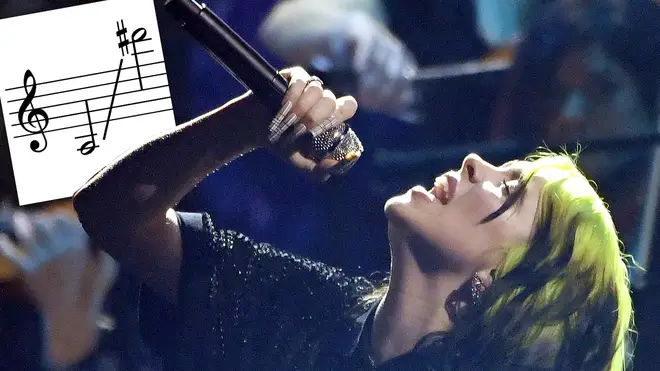On Air Now
Calm Classics with Myleene Klass 10pm - 1am
5 February 2024, 08:58

As the young pop superstar takes home her ninth Grammy Award aged just 22, we take a deep listen to her understated vocals.
Billie Eilish is one of the most successful singer-songwriters working today.
The pop teen has already sold millions of records, won nine Grammys – including two in 2024 for ‘What Was I Made For?’ from Barbie, which was named best song of the year – and recorded an iconic Bond song at just 18 years old, making her the youngest person ever to do so.
But how good is her voice, from a music analysis perspective? We go beyond the stardom and the slick production, and have a deep listen to Eilish’s isolated vocals in terms of tone, timbre, range and beyond.
Read more: A detailed musical analysis of Billie Eilish’s new Bond theme, ‘No Time to Die’

Billie Eilish performs James Bond theme "No Time To Die" for the first time
Eilish’s tone is typically soft and gentle, with a lyrical quality. She has a strong sense of pitch, something you will have heard while she’s riffing with brother, Finneas, during the songwriting process in Billie Eilish: The World’s a Little Blurry documentary, if you watched it. Or in Eilish’s live and a cappella performances.
She sings in an expressive way, with some vibrato, but she never pushes it beyond her natural voice to ‘belt’ – which is when a singer carries their ‘chest’ voice above their break to really force the sound.
There’s relatively little in the way of contrast in terms of volume or tone colour, when you compare Eilish’s voice to that of a classically trained singer. But that’s mainly because that’s not what this music requires, and ‘little’ doesn’t mean none. It’s all very subtle.
To really get into Eilish’s tone, start with ‘ocean eyes’, ‘everything i wanted’ and ‘i love you’, before having a close listen to ‘when the party’s over’.
Read more: Why do opera singers use so much vibrato?

Billie Eilish - Ocean Eyes (Official Music Video)
Billie Eilish’s understated authentic pop style calls for a beautiful and fragile timbre. Her voice is typically breathy and wispy, but no less strong and sure.
Like her tone, she doesn’t stretch into big contrasts when it comes to the timbre, by which we mean the quality or the style, of her voice.
But have a listen to ‘bellyache’ and then ‘COPYCAT’ to hear the range of qualities Eilish’s voice does have. It’s not that of an operatic soprano, perhaps, but it’s always controlled. You’ll hear that it suits gentle, acoustic guitar-led moments – where it’s characterised by soft, muffled textures (opening verses in the former song) – just as well as it does an electronic club banger, where she drops the interference in favour of a smoother, stronger vocal that cuts through (the latter – which you can hear below).
Her voice is comparable to that of New Zealand teen pop sensation Lorde, and Norwegian singer-songwriter Aurora.
Read more: Is Taylor Swift actually a good singer?

Billie Eilish - COPYCAT (Audio)
Billie Eilish’s voice is roughly around the mezzo-soprano range.
Using ‘COPYCAT’ as an example again, she does go right into the top soprano ranges very occasionally, but the song largely sits in that comfortable mezzo range during its chorus and the majority of the verses.
Yes. A good way to tell if pop or rock singers – singers who usually use microphones and perform with an amplified band – are good, is to strip it all back to just their voice.
Just listen to Eilish singing with no microphone, no amplification, and no production or effects to hide behind, from one-and-a-half minutes into this video:

Billie Eilish "idontwannabeyouanymore" Official Lyrics & Meaning | Verified
She expertly takes on one of her pop songs, sitting relaxedly in an interview with only her voice to fall back on. The tone is pure, perfectly pitched, and decorated with her idiosyncratic breathiness and well-controlled vibrato. You’ll hear she has impeccable control.
She glisses beautifully through the word ‘show (... and never tell)’ and she adds a drop of colour into the rhyming ‘know (...you too well)’, allowing ‘well’ to drop off naturally to end the phrase.
Elish understands musical phrasing, approaching it just as you would a line in your concerto solo in classical music, by controlling the breath and adding certain touches of colour and emphasis where needed.
And she uses her voice to emphasise the melody, again as we would in classical with our melody instruments. Sublime stuff.